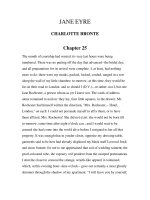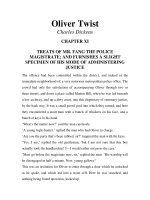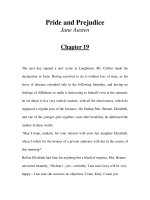LUYỆN ĐỌC TIẾNG ANH QUA TÁC PHẨM VĂN HỌC-Oliver Twist -Charles Dickens -CHAPTER I1
Bạn đang xem bản rút gọn của tài liệu. Xem và tải ngay bản đầy đủ của tài liệu tại đây (29.95 KB, 10 trang )
Oliver Twist
Charles Dickens
CHAPTER XI
TREATS OF MR. FANG THE POLICE
MAGISTRATE; AND FURNISHES A SLIGHT
SPECIMEN OF HIS MODE OF ADMINISTERING
JUSTICE
The offence had been committed within the district, and indeed in the
immediate neighborhood of, a very notorious metropolitan police office. The
crowd had only the satisfaction of accompanying Oliver through two or
three streets, and down a place called Mutton Hill, when he was led beneath
a low archway, and up a dirty court, into this dispensary of summary justice,
by the back way. It was a small paved yard into which they turned; and here
they encountered a stout man with a bunch of whiskers on his face, and a
bunch of keys in his hand.
’What’s the matter now?’ said the man carelessly.
’A young fogle-hunter,’ replied the man who had Oliver in charge.
’Are you the party that’s been robbed, sir?’ inquired the man with the keys.
’Yes, I am,’ replied the old gentleman; ‘but I am not sure that this boy
actually took the handkerchief. I—I would rather not press the case.’
’Must go before the magistrate now, sir,’ replied the man. ‘His worship will
be disengaged in half a minute. Now, young gallows!’
This was an invitation for Oliver to enter through a door which he unlocked
as he spoke, and which led into a stone cell. Here he was searched; and
nothing being found upon him, locked up.
This cell was in shape and size something like an area cellar, only not so
light. It was most intolably dirty; for it was Monday morning; and it had
been tenanted by six drunken people, who had been locked up, elsewhere,
since Saturday night. But this is little. In our station-houses, men and women
are every night confined on the most trivial charges—the word is worth
noting—in dungeons, compared with which, those in Newgate, occupied by
the most atrocious felons, tried, found guilty, and under sentence of death,
are palaces. Let any one who doubts this, compare the two.
The old gentleman looked almost as rueful as Oliver when the key grated in
the lock. He turned with a sigh to the book, which had been the innocent
cause of all this disturbance.
’There is something in that boy’s face,’ said the old gentleman to himself as
he walked slowly away, tapping his chin with the cover of the book, in a
thoughtful manner; ‘something that touches and interests me. CAN he be
innocent? He looked like—Bye the bye,’ exclaimed the old gentleman,
halting very abruptly, and staring up into the sky, ‘Bless my soul!—where
have I seen something like that look before?’
After musing for some minutes, the old gentleman walked, with the same
meditative face, into a back anteroom opening from the yard; and there,
retiring into a corner, called up before his mind’s eye a vast amphitheatre of
faces over which a dusky curtain had hung for many years. ‘No,’ said the old
gentleman, shaking his head; ‘it must be imagination.
He wandered over them again. He had called them into view, and it was not
easy to replace the shroud that had so long concealed them. There were the
faces of friends, and foes, and of many that had been almost strangers
peering intrusively from the crowd; there were the faces of young and
blooming girls that were now old women; there were faces that the grave
had changed and closed upon, but which the mind, superior to its power, still
dressed in their old freshness and beauty, calling back the lustre of the eyes,
the brightness of the smile, the beaming of the soul through its mask of clay,
and whispering of beauty beyond the tomb, changed but to be heightened,
and taken from earth only to be set up as a light, to shed a soft and gentle
glow upon the path to Heaven.
But the old gentleman could recall no one countenance of which Oliver’s
features bore a trace. So, he heaved a sigh over the recollections he
awakened; and being, happily for himself, an absent old gentleman, buried
them again in the pages of the musty book.
He was roused by a touch on the shoulder, and a request from the man with
the keys to follow him into the office. He closed his book hastily; and was at
once ushered into the imposing presence of the renowned Mr. Fang.
The office was a front parlour, with a panelled wall. Mr. Fang sat behind a
bar, at the upper end; and on one side the door was a sort of wooden pen in
which poor little Oliver was already deposited; trembling very much at the
awfulness of the scene.
Mr. Fang was a lean, long-backed, stiff-necked, middle-sized man, with no
great quantity of hair, and what he had, growing on the back and sides of his
head. His face was stern, and much flushed. If he were really not in the habit
of drinking rather more than was exactly good for him, he might have
brought action against his countenance for libel, and have recovered heavy
damages.
The old gentleman bowed respectfully; and advancing to the magistrate’s
desk, said suiting the action to the word, ‘That is my name and address, sir.’
He then withdrew a pace or two; and, with another polite and gentlemanly
inclination of the head, waited to be questioned.
Now, it so happened that Mr. Fang was at that moment perusing a leading
article in a newspaper of the morning, adverting to some recent decision of
his, and commending him, for the three hundred and fiftieth time, to the
special and particular notice of the Secretary of State for the Home
Department. He was out of temper; and he looked up with an angry scowl.
’Who are you?’ said Mr. Fang.
The old gentleman pointed, with some surprise, to his card.
’Officer!’ said Mr. Fang, tossing the card contemptuously away with the
newspaper. ‘Who is this fellow?’
’My name, sir,’ said the old gentleman, speaking LIKE a gentleman, ‘my
name, sir, is Brownlow. Permit me to inquire the name of the magistrate
who offers a gratuitous and unprovoked insult to a respectable person, under
the protection of the bench.’ Saying this, Mr. Brownlow looked around the
office as if in search of some person who would afford him the required
information.
’Officer!’ said Mr. Fang, throwing the paper on one side, ‘what’s this fellow
charged with?’
’He’s not charged at all, your worship,’ replied the officer. ‘He appears
against this boy, your worship.’
His worshp knew this perfectly well; but it was a good annoyance, and a safe
one.
’Appears against the boy, does he?’ said Mr. Fang, surveying Mr. Brownlow
contemptuously from head to foot. ‘Swear him!’
’Before I am sworn, I must beg to say one word,’ said Mr. Brownlow; ‘and
that is, that I really never, without actual experience, could have believed—’
’Hold your tongue, sir!’ said Mr. Fang, peremptorily.
’I will not, sir!’ replied the old gentleman.
’Hold your tongue this instant, or I’ll have you turned out of the office!’ said
Mr. Fang. ‘You’re an insolent impertinent fellow. How dare you bully a
magistrate!’
’What!’ exclaimed the old gentleman, reddening.
’Swear this person!’ said Fang to the clerk. ‘I’ll not hear another word.
Swear him.’
Mr. Brownlow’s indignaton was greatly roused; but reflecting perhaps, that
he might only injure the boy by giving vent to it, he suppressed his feelings
and submitted to be sworn at once.
’Now,’ said Fang, ‘what’s the charge against this boy? What have you got to
say, sir?’
’I was standing at a bookstall—’ Mr. Brownlow began.
’Hold your tongue, sir,’ said Mr. Fang. ‘Policeman! Where’s the policeman?
Here, swear this policeman. Now, policeman, what is this?’
The policeman, with becoming humility, related how he had taken the
charge; how he had searched Oliver, and found nothing on his person; and
how that was all he knew about it.
’Are there any witnesses?’ inquired Mr. Fang.
’None, your worship,’ replied the policeman.
Mr. Fang sat silent for some minutes, and then, turning round to the
prosecutor, said in a towering passion.
’Do you mean to state what your complaint against this boy is, man, or do
you not? You have been sworn. Now, if you stand there, refusing to give
evidence, I’ll punish you for disrespect to the bench; I will, by—’
By what, or by whom, nobody knows, for the clerk and jailor coughed very
loud, just at the right moment; and the former dropped a heavy book upon
the floor, thus preventing the word from being heard—accidently, of course.









